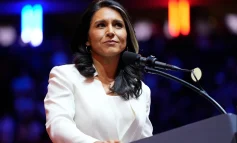Obama brags about bin Laden killing, renews commitment to Israel and pledges to prevent nuclear Iran

|
| U.S. President Barack Obama shakes hands with congressional pages following his State of the Union address to a joint session of Congress on Capitol Hill in Washington, January 24, 2012. REUTERS/Jason Reed |
WASHINGTON – U.S. President Barack Obama said Tuesday that a peaceful outcome was still possible in the international standoff with Iran over its nuclear ambitions while he declined to rule out the military option.
His remarks suggested the window for diplomacy was narrowing at a time when Iran has threatened to close the Strait of Hormuz — a key waterway for the world’s oil — in the face of tightening international sanctions.
The world community has overcome its divisions and was now united on how to check Iran’s nuclear ambitions, Obama told lawmakers from both chambers of the U.S. Congress during his annual State of the Union speech.
The president said such unity was achieved through “the power of our diplomacy,” glossing over the fact that Russia and China remain opposed to the tightening sanctions.
“The regime is more isolated than ever before; its leaders are faced with crippling sanctions, and as long as they shirk their responsibilities, this pressure will not relent,” Obama said.
“Let there be no doubt: America is determined to prevent Iran from getting a nuclear weapon, and I will take no options off the table to achieve that goal,” the president declared, triggering a standing ovation.
“But a peaceful resolution of this issue is still possible, and far better,” the president said. “And if Iran changes course and meets its obligations, it can rejoin the community of nations.”
Obama, a Democrat, delivered his speech 10 months before he faces reelection, as his Republican opponents paint him as weak on Iran.
In November, a UN International Atomic Energy Agency report said the agency was able to build an overall impression that Tehran “carried out activities relevant to the development of a nuclear explosive device.”
Iran rejected the report as baseless.
The United States and the European Union have since stepped up sanctions targeting Iran’s oil industry and central bank in a bid to force Iran to stop uranium enrichment, which they fear masks a drive to produce an atomic bomb.
Iran insists its enrichment program is purely peaceful.
Iran’s leaders have warned they could close the Strait of Hormuz if increased Western sanctions over Tehran’s suspect nuclear program halt Iranian oil exports.
Defense Secretary Leon Panetta said last week that the United States is “fully prepared” for any confrontation with Iran over the strategic Strait of Hormuz, but hopes a dispute would be resolved peacefully.
Despite statements from Iran that it wants to return to negotiations last held in Turkey a year ago, the six powers dealing with Iran’s nuclear program have yet to receive an adequate response, according to the European Union.
The six powers are the United States, China, Russia, Britain, France and Germany.
In a speech that focused only a small part on foreign policy, Obama issued brief statements about U.S. ally Israel, which is most worried about Iran’s nuclear program, and Syria, which is Iran’s ally.
“Our iron-clad commitment to Israel’s security has meant the closest military cooperation between our two countries in history,” Obama said.
Obama also said that Osama bin Laden is not a threat to the United States for the first time in two decades, referencing his killing by a U.S. SEAL team, remarks that drew applause. He also spoke about Syrian President Bashar al-Assad.
“In Syria, I have no doubt that the (Bashar) Assad regime will soon discover that the forces of change can’t be reversed, and that human dignity can’t be denied,” he said, referring to the crackdown on pro-democracy protests.
Secretary of State Hillary Clinton was among those seen clapping and smiling in the audience.
Report: Iran unlikely to have nuclear weapon in 2012
Iran is unlikely to move towards building a nuclear weapon in 2012 because it cannot yet produce enough weapon-grade uranium and is being deterred by sanctions and the prospect of an Israeli attack, according to a draft report by the Institute for Science and International Security (ISIS).
The report by the institute founded by nuclear expert David Albright offers a more temperate view of Iran’s program than some of the heated rhetoric that has surfaced since the United States and its allies stepped up sanctions on Tehran, and also says that sanctions and fear of a strike have been a deterrent.
The ISIS analysis is revealed after a prediction that Israel will attack Iran in 2012 to try and stop any nuclear bomb program.
“Iran is unlikely to decide to dash toward making nuclear weapons as long as its uranium enrichment capability remains as limited as it is today,” the report said.
The U.S. and Iran are engaged in a war of words over sanctions, with Tehran threatening to retaliate by blocking oil shipping traffic through the Strait of Hormuz. The United States has said it will not allow that to happen. There are concerns the situation might spiral into a military confrontation.
The ISIS report, financed by a grant from the United States Institute of Peace, says Iran had not made a decision to build a nuclear bomb. USIP is an independent, non-partisan center created by the U.S. Congress in 1984 that receives federal government funding.
-TAAN






Leave a Reply